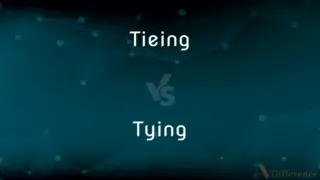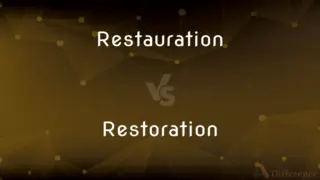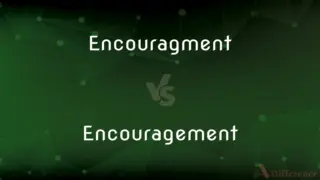Halt vs. Hault — Which is Correct Spelling?
By Tayyaba Rehman — Updated on March 20, 2024
"Halt" is the correct spelling, referring to a stop or pause, while "Hault" is incorrect.
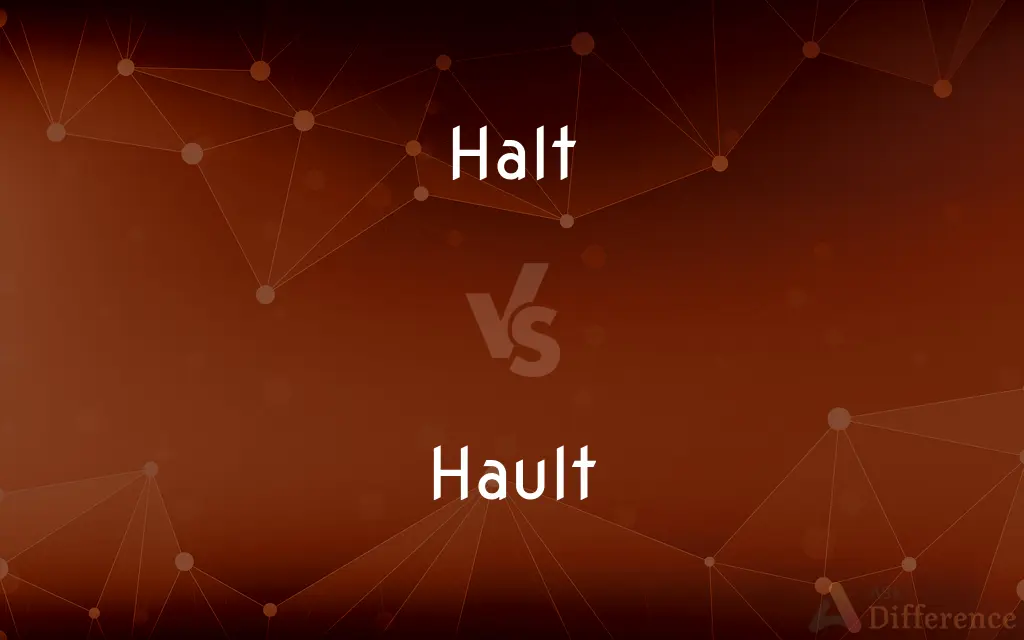
Table of Contents
Which is correct: Halt or Hault
How to spell Halt?

Halt
Correct Spelling

Hault
Incorrect Spelling
ADVERTISEMENT
Key Differences
The word "halt" sounds like "alt," a key on your keyboard, without the "h."
"Halt" rhymes with "malt," which is spelled with "al," not "aul."
"Halt" shares the "al" pattern with words like "talk" and "walk."
There's no "u" in "stop," so remember there's no "u" in "halt" either.
"Halt" is shorter than "stop"; similarly, it uses fewer letters than "hault."
ADVERTISEMENT
How Do You Spell Hault Correctly?
Incorrect: The car came to a hault at the stop sign.
Correct: The car came to a halt at the stop sign.
Incorrect: We must hault production immediately.
Correct: We must halt production immediately.
Halt Definitions
To bring to a standstill.
The guard raised his hand to halt the oncoming traffic.
To cause to discontinue an activity or process.
The factory was forced to halt production due to a power outage.
A command given to stop immediately.
Halt! shouted the officer, stopping the suspects in their tracks.
To arrest the progress or motion of something temporarily.
Negotiations were halt due to a disagreement among the parties.
A temporary suspension of movement or activity.
The sudden halt of the music left the dancers confused.
A suspension of movement or progress, especially a temporary one
The car rolled to a halt when it stalled.
To cause to stop
The government hopes to halt tax fraud.
To stop; pause
The hikers halted for lunch and some rest.
To walk lamely or move in an irregular fashion.
To proceed or act with uncertainty or indecision; waver.
To be defective or proceed poorly, as in the development of an argument in logic or in the rhythmic structure of verse.
Lame; crippled.
(intransitive) To limp; move with a limping gait.
(intransitive) To stand in doubt whether to proceed, or what to do; hesitate; be uncertain; linger; delay; mammer.
(intransitive) To be lame, faulty, or defective, as in connection with ideas, or in measure, or in versification.
To waver.
To falter.
(intransitive) To stop marching.
(intransitive) To stop either temporarily or permanently.
(transitive) To bring to a stop.
(transitive) To cause to discontinue.
The contract negotiations halted operations for at least a week.
A cessation, either temporary or permanent.
The contract negotiations put a halt to operations.
(rail) A minor railway station (usually unstaffed) in the United Kingdom.
The halt itself never achieved much importance, even with workers coming to and from the adjacent works.
(dated) Lameness; a limp.
(archaic) Lame, limping.
A stop in marching or walking, or in any action; arrest of progress.
Without any halt they marched.
[Lovers] soon in passion's war contest,Yet in their march soon make a halt.
The act of limping; lameness.
To hold one's self from proceeding; to hold up; to cease progress; to stop for a longer or shorter period; to come to a stop; to stand still.
To stand in doubt whether to proceed, or what to do; to hesitate; to be uncertain.
How long halt ye between two opinions?
To cause to cease marching; to stop; as, the general halted his troops for refreshment.
To walk lamely; to limp.
To have an irregular rhythm; to be defective.
The blank verse shall halt for it.
Halting or stopping in walking; lame.
Bring in hither the poor, and the maimed, and the halt, and the blind.
The state of inactivity following an interruption;
The negotiations were in arrest
Held them in check
During the halt he got some lunch
The momentary stay enabled him to escape the blow
He spent the entire stop in his seat
The event of something ending;
It came to a stop at the bottom of the hill
An interruption or temporary suspension of progress or movement;
A halt in the arms race
A nuclear freeze
Cause to stop;
Halt the engines
Arrest the progress
Halt the presses
Come to a halt, stop moving;
The car stopped
She stopped in front of a store window
Stop from happening or developing;
Block his election
Halt the process
Stop the flow of a liquid;
Staunch the blood flow
Them the tide
Disabled in the feet or legs;
A crippled soldier
A game leg
Halt Meaning in a Sentence
The power failure brought the factory's operations to a halt.
Halt Idioms & Phrases
Grind to a halt
To slowly come to a stop, usually due to a problem or obstacle.
Traffic ground to a halt after the accident on the highway.
Bring to a halt
To cause to stop completely.
The power failure brought the factory's operations to a halt.
Halt and catch fire
Originally a computing term for a machine stopping due to a catastrophic error, often used metaphorically.
The plan halt and caught fire when the key investor pulled out.
Halt production
To stop the process of making or producing something.
The factory had to halt production due to a shortage of materials.
Halt in its tracks
To stop suddenly or immediately.
The startling news made everyone halt in their tracks.
Come to a screeching halt
To stop very suddenly, often in a dramatic or unexpected way.
The project came to a screeching halt when the funding was withdrawn.
Halt operations
To stop all activities or operations, especially in business or manufacturing.
Due to the storm, the company had to halt operations for safety.
Put a halt to
To end or stop something definitively.
The new law put a halt to illegal parking in the city.
Halt proceedings
To stop or pause formal actions or discussions.
The judge halted proceedings until further evidence could be reviewed.
Halt negotiations
To pause or stop discussions or talks.
Both parties agreed to halt negotiations until further information was provided.
Halt for thought
To pause to think carefully or reconsider.
The unexpected question caused her to halt for thought.
Signal a halt
To give a sign or indication that something should stop.
The coach signaled a halt to the practice session after noticing the players' fatigue.
Call a halt to
To demand that something be stopped.
The mayor called a halt to the construction until safety inspections could be conducted.
At a halt
In a state of being stopped or not moving.
With negotiations at a halt, there was no progress on the issue.
Halt for inspection
To stop in order to undergo an examination or review.
The vehicle was halted for inspection at the border checkpoint.
Halt under pressure
To stop because of stress or external forces.
The team's progress halted under pressure from the tight deadline.
Halt in progress
To stop advancing or moving forward.
The project's halt in progress was due to unforeseen technical issues.
Halt for repairs
To stop operating in order to fix something that is broken.
The machine was halted for repairs after a malfunction was detected.
Halt the spread
To stop or control the expansion or proliferation of something.
Efforts were made to halt the spread of the virus in the community.
Halt the advance
To stop the forward movement, especially in a military context.
The troops managed to halt the advance of the enemy forces.
Common Curiosities
Why is it called Halt?
It is called "halt" from the German 'halten' meaning to hold, stop or keep.
What is the pronunciation of Halt?
Halt is pronounced as /hɔːlt/.
Which vowel is used before Halt?
The vowel "a" is used before "halt" as in "a halt."
Which preposition is used with Halt?
"To" is commonly used as in "come to a halt."
What is the root word of Halt?
The root of "halt" is the German word 'halten', which means to hold or stop.
What is the verb form of Halt?
"Halt" itself is the base verb form.
Is Halt an abstract noun?
When "halt" is used as a noun, it is not abstract; it refers to a concrete stop.
Which conjunction is used with Halt?
"And" can be used with "halt" in a compound sentence.
Is Halt a noun or adjective?
"Halt" can be used as both a noun and a verb, but not an adjective.
What is the first form of Halt?
The first form is "halt" as a verb.
What is the singular form of Halt?
The singular form is "halt."
What is the plural form of Halt?
The plural form can be "halts" when used as a noun indicating multiple instances of stopping.
Which article is used with Halt?
Both "a" and "the" can be used depending on the context.
What part of speech is Halt?
"Halt" can be a verb or a noun.
What is the opposite of Halt?
The opposite of "halt" is "continue" or "proceed."
Is the word Halt Gerund?
No, "halt" does not function as a gerund; it’s a base verb and can be a noun.
Is the word “Halt” a Direct object or an Indirect object?
"Halt," when used as a noun, can be a direct object, but not an indirect object.
How is Halt used in a sentence?
"The approaching train came to a halt at the signal."
Is Halt an adverb?
No, "halt" is not used as an adverb.
Is Halt a negative or positive word?
"Halt" is neutral; its positive or negative connotation depends on context.
Is Halt a countable noun?
When used as a noun, "halt" can be countable.
How many syllables are in Halt?
There is one syllable in "halt."
How do we divide Halt into syllables?
"Halt" does not divide into syllables; it is a single syllable.
What is a stressed syllable in Halt?
In the word "halt," the single syllable is stressed: /hɔːlt/.
Is Halt a vowel or consonant?
"Halt" begins with the consonant "h."
Is Halt a collective noun?
No, "halt" is not typically used as a collective noun.
Is the Halt term a metaphor?
"Halt" can be used metaphorically to signify a stop in progress or action.
Is the word Halt imperative?
"Halt" can be used as an imperative command.
What is another term for Halt?
Another term for "halt" is "stop."
Which determiner is used with Halt?
Determiners like "a," "the," or "this" can be used with "halt."
What is the second form of Halt?
The second form is "halted" (past tense).
What is the third form of Halt?
The third form is "halted" (past participle).
Share Your Discovery
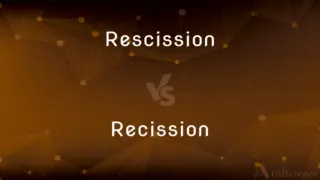
Previous Comparison
Rescission vs. Recission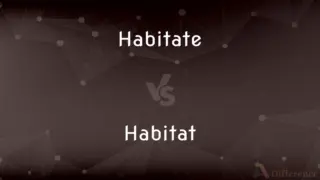
Next Comparison
Habitate vs. HabitatAuthor Spotlight
Written by
Tayyaba RehmanTayyaba Rehman is a distinguished writer, currently serving as a primary contributor to askdifference.com. As a researcher in semantics and etymology, Tayyaba's passion for the complexity of languages and their distinctions has found a perfect home on the platform. Tayyaba delves into the intricacies of language, distinguishing between commonly confused words and phrases, thereby providing clarity for readers worldwide.

